Envisioning Equality: Faculty and Staff Award Winners
On behalf of the Planning and Awards committees for the Envisioning Equality public art project, I am thrilled to announce the recipients of the Envisioning Equality awards on International Women's Day. This is the first award of its kind initiated to highlight and celebrate exceptional women and gender-diverse faculty and staff at UBC.
I am very grateful for funding of this project that has been provided by the UBC Office of the President, the Equity & Inclusion Office, the Office of the Provost (UBCV); and generous donations from alumni/ae, and other friends and supporters.
-Naznin Virji-Babul, Associate Professor and Senior Advisor to the Provost on Women and Gender-Diverse Faculty
Everything we do as a society depends upon the skills, talents and contributions of women and gender-diverse individuals around the world. I would like to congratulate the Envisioning Equity recipients, and to say a heartfelt thank-you for all that you do at UBC, and in the community.
-Santa J. Ono, President and Vice-Chancellor
For over a century, women and gender-diverse faculty and staff at the University of British Columbia have been making significant contributions to the institution. Our ten Envisioning Equality recipients have each contributed so much to the world in which we live, building community, understanding and innovation with everything they do. Congratulations to the individuals on their recognition.
-Moura Quayle, Vice-Provost and Associate Vice-President, Academic Affairs, Office of the Provost and Vice-President Academic, UBC Vancouver
Under the direction of Barbara Cole, (Curator of Outdoor Art, Morris and Helen Belkin Art Gallery) an Artist Selection panel has been formed to select an artist to develop the concept for how the award winners will be represented and in turn, create ten unique artwork/images to be featured on street banners along one of the campus' main arteries. The art project will be launched in 2023.
Faculty recipients
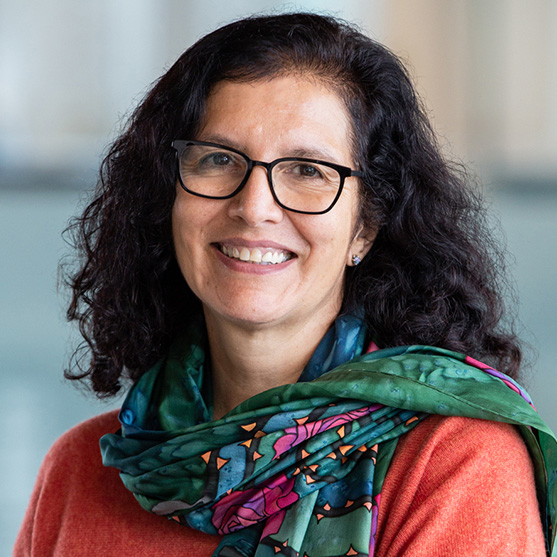 Dr. Melania Alvarez, Faculty of Science, has been a Sessional Lecturer and Research Associate since 2005, and holds the title of Outreach Coordinator for the Department of Mathematics and Education Coordinator for the Pacific Institute for Mathematical Sciences.
Dr. Melania Alvarez, Faculty of Science, has been a Sessional Lecturer and Research Associate since 2005, and holds the title of Outreach Coordinator for the Department of Mathematics and Education Coordinator for the Pacific Institute for Mathematical Sciences.
The highlight of Melania's work is her outreach to Canada's Indigenous communities. She is without question the mainstay for the Pacific Institute's extensive outreach program. She is a key part of a partnership with First Nations schools, serving as a resource for enhancing the teaching of mathematics. She also steers partnerships with the Vancouver School Board, the Burnaby School Board, and the Urban Native Youth Association (UNYA) to amplify opportunities for Indigenous students in the Lower Mainland.
Although much of her focus is on working with Indigenous students, Melania Alvarez also plays an active role in promoting mathematics among the general population. Each year, she helps organize Math Mania an elementary mathematics contest at UBC; runs a math circle for students in grades 4-7, problem-solving workshops for students at elementary and secondary schools, math workshops for elementary and secondary school teachers and parents; and engages in active fundraising to support a wide range of education activities. She was the 2012 winner of the Adrien Pouliot Award, given by the Canadian Mathematical Society for significant contributions to mathematics education in Canada.
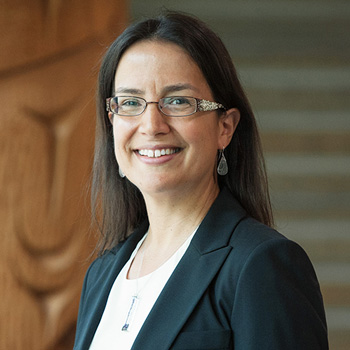 Dr. Nadine Caron, Professor, Department of Surgery, Northern Medical Program, Faculty of Medicine, and Founding Co-Director, Centre for Excellence in Indigenous Health, has a focus on research programs teaching, mentorship and advocacy for Indigenous equity that are so closely intertwined it is difficult to describe them in separate categories. Her research and clinical work directly impacts inclusivity for Indigenous patients.
Dr. Nadine Caron, Professor, Department of Surgery, Northern Medical Program, Faculty of Medicine, and Founding Co-Director, Centre for Excellence in Indigenous Health, has a focus on research programs teaching, mentorship and advocacy for Indigenous equity that are so closely intertwined it is difficult to describe them in separate categories. Her research and clinical work directly impacts inclusivity for Indigenous patients.
Nadine is a trail-blazing Indigenous scholar who leads the Northern Biobank Initiative (NBI) and co-leads the Silent Genomes project, which addresses equity in genomic diagnosis. Although this project is focused on the delivery of rare disease genetic health care, it also addresses the lack of genomic reference data for Indigenous people of Canada in publicly available databases.
Nadine's advocacy is not limited to Indigenous patients and community members. She is a tireless advocate for better recruitment and retention of Indigenous researchers and trainees in health professions at UBC and beyond. She led the proposal for UBC's Centre for Excellence in Indigenous Health (CEIH) and co-led the creation of the UBC Centre for Excellence in Indigenous Health's own “UBC Certificate in Indigenous Public Health.” She is also responsible for a cultural safety and humility curriculum for first-year UBC students in 13 health professions. Based on the Truth and Reconciliation Calls to Action #23 and #24, the UBC 23-24 curriculum was launched in 2017 through the CEIH; to date approximately 2000 UBC students have completed this curriculum.
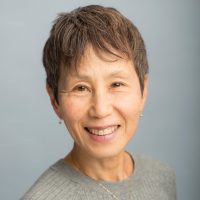 Dr. Ryuko Kubota, Professor in the Department of Language and Literacy Education, Faculty of Education, is a scholar in the field of applied linguistics. Her work unpacks the interlocking relations among social forces, such as power, politics, and ideologies, linguistic practices, and socioeconomic structures. It also questions assumptions related to language education and aims to promote equity, social justice, and anti-oppressive approaches to language education.
Dr. Ryuko Kubota, Professor in the Department of Language and Literacy Education, Faculty of Education, is a scholar in the field of applied linguistics. Her work unpacks the interlocking relations among social forces, such as power, politics, and ideologies, linguistic practices, and socioeconomic structures. It also questions assumptions related to language education and aims to promote equity, social justice, and anti-oppressive approaches to language education.
Ryuko's scholarship links underlying critical multiculturalism to antiracism, drawing scholars' attention to race, racialization, and racism in the field. She pointed out racial biases in our knowledge system and critically examined how the criteria specific to white knowledge, as seen in citation practices for example, make all scholars, including women scholars of color, complicit with a EuroAmerican male-dominant epistemic hegemony, further marginalizing minoritized scholars and alternative epistemologies.
Ryuko has demonstrated a sustained and committed approach to mentoring within the Faculty of Education. Since 2009, she has mentored 22 MA and PhD students, 20 of whom are international students. She is a dedicated mentor to pre-tenure faculty within the Faculty and to other scholars, particularly Asian women, outside UBC.
Overall, Ryuko's research has led the field, introducing new inquiry topics and perspectives as well as examining other themes that promote linguistic, cultural, and human diversity and justice.
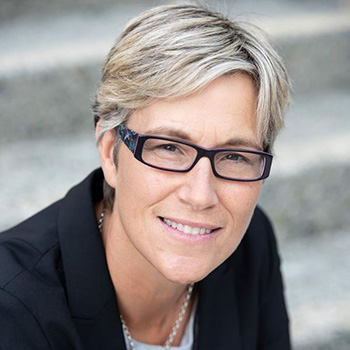 Dr. Sheryl Staub-French, Associate Dean of Equity, Diversity and Inclusion in the Faculty of Applied Science and Professor in the Department of Civil Engineering, is Director of the BIM TOPiCS Lab where she leads inter-disciplinary research focused on developing methods and tools to support the digital delivery of sustainable building construction projects through effective and collaborative use of building information modeling.
Dr. Sheryl Staub-French, Associate Dean of Equity, Diversity and Inclusion in the Faculty of Applied Science and Professor in the Department of Civil Engineering, is Director of the BIM TOPiCS Lab where she leads inter-disciplinary research focused on developing methods and tools to support the digital delivery of sustainable building construction projects through effective and collaborative use of building information modeling.
As the first Associate Dean of Equity, Diversity and Inclusion in the Faculty of Applied Science, Sheryl is a strong leader and advocate working to embed Equity, Diversity Inclusion, and Indigeneity (EDII) into the Faculty's systems, structures, and culture. She leads several initiatives to advance faculty, staff and student EDII competencies, develop EDII hiring practices, engage in dialogue about EDII issues, support underrepresented and underserved students, and facilitate EDI.I leadership in all departments and programs, as well as a number of other initiatives, including workshops and seminars to further seed understanding of the importance of EDII in the Faculty.
Additionally, her leadership of Geering Up, an outreach program to provide youth with opportunities to engage in STEM, has helped to significantly expand the reach of this organization. She has helped lead Geering Up to focus on the entire ecosystem of support for kids, particularly underrepresented and underserved communities. From establishing professional development programs that help teachers integrate STEM and minimize the effects of implicit gender bias in the classroom, to providing workshops for Indigenous youth in remote communities, she has overseen the development of a range of programs that enable influencers—teachers, counsellors, parents, and others—to support and encourage girls, Indigenous youth, and other underserved populations to pursue STEM every step of the way. In 2019, Geering Up reached over 28,000 individuals across 62 communities, including almost 50% girls, 6,000 youth from 29 inner-city schools, and 2,700 Indigenous youth.
 Dr. Sabrina Wong, Professor in the School of Nursing and Centre for Health Services and Policy Research, Faculty of Applied Science, is a scholar at the forefront of the population and public health field, and a leader in community initiatives in health and health equity.
Dr. Sabrina Wong, Professor in the School of Nursing and Centre for Health Services and Policy Research, Faculty of Applied Science, is a scholar at the forefront of the population and public health field, and a leader in community initiatives in health and health equity.
Sabrina's research examines the organization and delivery of services within the context of primary health care. A recognized leader in research involving patient-reported experiences and outcomes of care, her work contributes to informing practice- and system-level interventions that seek to decrease health inequities among Canadian residents, including people who face multiple disadvantages in accessing and using the health care system, such as those who have language barriers and live in poverty. Her long-standing commitment to research has significantly contributed to further understanding and application of primary health care in helping to reduce health and health care inequities.
Sabrina has extensive mentoring experience and has supported 48 graduate students (including masters and doctoral level) through to completion as supervisor or supervisory committee member. As a woman of colour, Sabrina has served as a role model to ethnically and culturally diverse undergraduate and graduate students throughout her career, providing them with strong support to develop expertise and excellence in the scholarly environment.
Sabrina also demonstrates exemplary community impact. During the past two years of the COVID-19 pandemic, she worked with the university administration to implement rapid antigen testing, which led to UBC Vancouver's first nurse-led on-site clinical study of a medical device and Canada's only clinical study on self-administration of a rapid antigen test for asymptomatic people.
Staff recipients
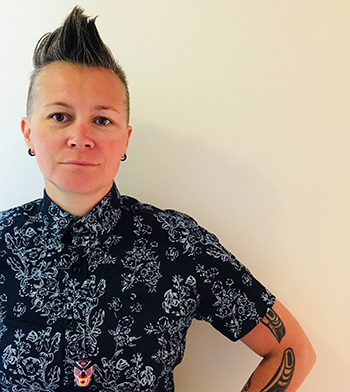 Michelle Cameron, Investigator with the UBC Investigations Office, is Dakelh First Nations. Michelle completed her Bachelor of Arts, Bachelor of Social Work, and Master of Social Work degrees at UBC, and is currently completing a Juris Doctor degree at the UBC Allard School of Law. In 2008, Michelle joined the RCMP as a civilian member, working as a criminal intelligence analyst for nine years in myriad units including Divisional Criminal Analysis, Indigenous Policing, and National Security. In 2012, she was awarded the Queen Elizabeth II Diamond Jubilee Medal for honourable service to Canada for her work in the RCMP. In January 2017, she moved into policing oversight as a senior investigator with the Civilian Review Complaints Commission, investigating allegations of officer misconduct. Michelle joined UBC and the IO in October 2018.
Michelle Cameron, Investigator with the UBC Investigations Office, is Dakelh First Nations. Michelle completed her Bachelor of Arts, Bachelor of Social Work, and Master of Social Work degrees at UBC, and is currently completing a Juris Doctor degree at the UBC Allard School of Law. In 2008, Michelle joined the RCMP as a civilian member, working as a criminal intelligence analyst for nine years in myriad units including Divisional Criminal Analysis, Indigenous Policing, and National Security. In 2012, she was awarded the Queen Elizabeth II Diamond Jubilee Medal for honourable service to Canada for her work in the RCMP. In January 2017, she moved into policing oversight as a senior investigator with the Civilian Review Complaints Commission, investigating allegations of officer misconduct. Michelle joined UBC and the IO in October 2018.
Michelle's role as an Investigator entails conducting trauma-informed investigations and alternative resolution processes in response to complaints under UBC's Sexual Misconduct Policy (SC17) and Discrimination Policy (SC7). She also regularly engages with other UBC and community stakeholders to build relationships and collaboratively improve UBC's response to these issues. In working to address sexual misconduct and discrimination, Michelle furthers UBC's goal of creating a respectful and inclusive community each day.
Throughout her time at the IO, Michelle has been a creative leader in broadening the range of alternative resolution processes that are available to parties to sexual misconduct and discrimination complaints. Michelle believes broadening our alternative resolution practices and being open to non-traditional, less legalistic responses to sexual misconduct and discrimination is the best chance UBC has at fostering a culture of accountability, and making real change.
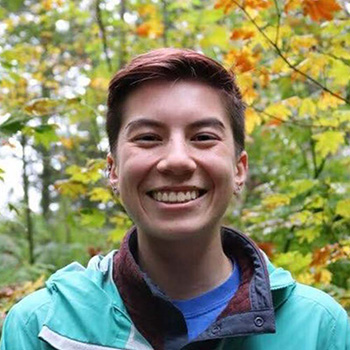 Em Mittertreiner is the Student Director, UBC Climate Hub. During their time at UBC, including as Community Engagement Coordinator and now as Student Director of the Hub, Em has been a key architect of the Hub's push to centre justice in its work and practice.
Em Mittertreiner is the Student Director, UBC Climate Hub. During their time at UBC, including as Community Engagement Coordinator and now as Student Director of the Hub, Em has been a key architect of the Hub's push to centre justice in its work and practice.
They have an extensive background in both the study and practice of mutual aid and anti-oppression work, including: co-developing the Allyship Network LIVE Study, a large-scale experiment to test the efficacy of an online gender allyship intervention for their third-year honours thesis; developing a series of arts-based, peer support-oriented workshops for a cohort of 20 Asian diasporic youth for the Hua Foundation; sitting on the UBC Trans, Two-Spirit and Gender Diversity Taskforce; and engaging classrooms and adolescent community groups in upwards of 50 total workshops on mental health, social justice, migrant justice, and climate justice as a Youth Facilitator for Check Your Head.
 Shawna Narayan, Research Analyst, UBC Family Practice, is dedicated to addressing inequalities in healthcare and education. As part of the REDONNA study team, she contributes to crucial research that aims to the improve safety of opioid prescribing in primary care. The study investigates the effectiveness of individualized prescribing portraits to reduce inappropriate initiation of opioid analgesics.
Shawna Narayan, Research Analyst, UBC Family Practice, is dedicated to addressing inequalities in healthcare and education. As part of the REDONNA study team, she contributes to crucial research that aims to the improve safety of opioid prescribing in primary care. The study investigates the effectiveness of individualized prescribing portraits to reduce inappropriate initiation of opioid analgesics.
Shawna is also the Executive Director of Empower The Future, an award-winning non-profit organization. Through her non-profit's projects, she focuses on breaking barriers in STEM fields for underrepresented groups, providing mentorship and peer-support to inner-city youth transitioning to post-secondary school, and supporting youth mental wellbeing.
In reflecting on her experience as one of the few women in her UBC physics lab, Shawna created the Diversity in Science, Technology, Engineering, and Mathematics (STEM) project to provide support for underrepresented groups (Women, 2SLGBTQIA+, Indigenous, and individuals with disabilities and/or mental illnesses) in STEM by developing informative workshops and much-needed resources. Her mission is for society to understand that there is no way forward in STEM without inclusivity of marginalized, creative, and barrier-breaking people.
 Deb Pickman, Special Projects, UBC Arts & Culture District, Faculty of Arts, is co-founder, ensemble member and co-artistic director of the Vancouver theatre company shameless hussy productions. As an actor she has toured throughout North America and Europe with her own company and several others since 1993.
Deb Pickman, Special Projects, UBC Arts & Culture District, Faculty of Arts, is co-founder, ensemble member and co-artistic director of the Vancouver theatre company shameless hussy productions. As an actor she has toured throughout North America and Europe with her own company and several others since 1993.
Deb is also a specialist in project management as well as all aspects of marketing and communications for the arts. She initiated the highly successful annual student-run ARTIVISM festival. She is a recipient of the UBC President's Service Award for Excellence, the Vancouver Sun People's Choice Award for Outstanding Actress, two Jessie Richardson Award nominations and UBC's Sharon Yacowar Frohlinger Memorial Scholarship.
Deb is described as "an absolute beacon of hope and possibility in the UBC community," who "is filled with passion for uplifting students and marginalized communities in the arts."
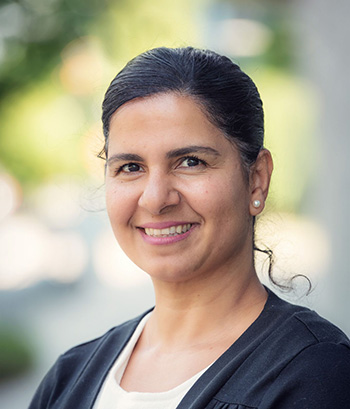 Dr. Afsaneh Sharif, Faculty Liaison/Senior Project Manager with the Centre for Teaching, Learning and Technology, is committed to translating research findings into practice and works closely with faculty members to ensure that course/program design and development meet best practice standards. Her focus includes quality enhancement, accessibility, online learning, flexible learning, community of practice, open education, inclusion and diversity, and universal design for learning. She has also produced courses to facilitate this process.
Dr. Afsaneh Sharif, Faculty Liaison/Senior Project Manager with the Centre for Teaching, Learning and Technology, is committed to translating research findings into practice and works closely with faculty members to ensure that course/program design and development meet best practice standards. Her focus includes quality enhancement, accessibility, online learning, flexible learning, community of practice, open education, inclusion and diversity, and universal design for learning. She has also produced courses to facilitate this process.
She has served on the AAPS Board of Directors since 2015 (currently AAPS President) to ensure members are respected and heard equally. She is serving on the BC Digital Learning Advisory Committee at the Ministry of Advanced Education. She is also a member of the Vice-Presidential Strategic Implementation Committee for Equity and Diversity and has recently joined the IBPOC Connection Advisory Group.
Afsaneh believes in social justice, anti-racist and inclusive approaches to teaching and learning , and has developed a diverse expertise as an educational consultant, and has built strong relationships and connections with the teaching and learning community within CTLT and across the UBC campus.